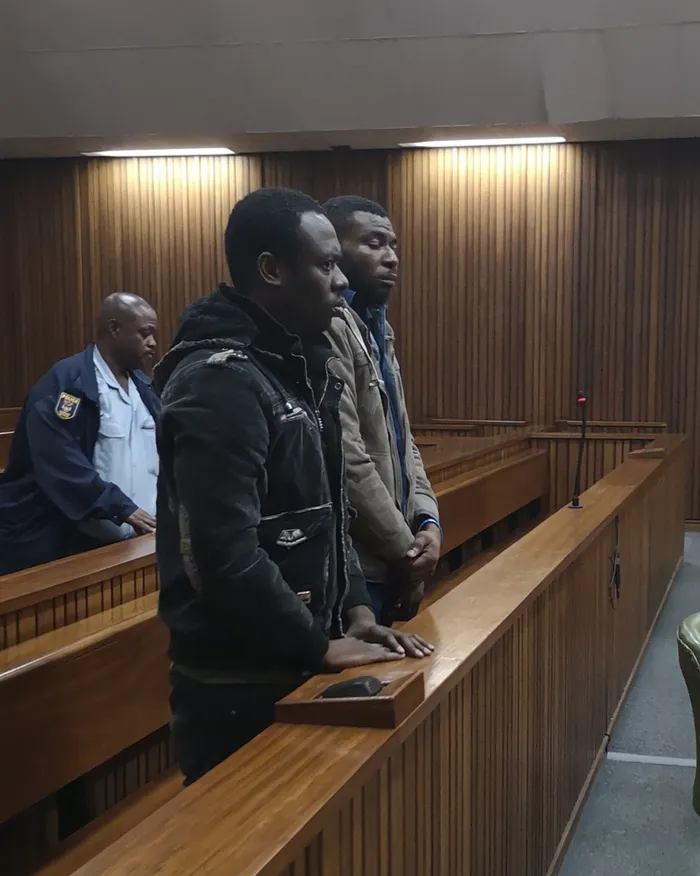
Obioma Benjamin Abba and Chinedu Justine Obasi earlier when they were sentenced for human trafficking.
Image: Zelda Venter
Human trafficking exists because people are vulnerable to exploitation as a result of poverty, lack of education and desperation. It is a modern-day form of slavery, a judge said in turning down the appeal of a Nigerian citizen sentenced to 18 years imprisonment for forcing women to work as prostitutes.
Two pimps who ran a brothel in Arcadia, Pretoria, were sentenced in the Gauteng High Court, Pretoria, eight years ago in a case which was said to be a first in this division.
Obioma Benjamin Abba, 32 was sentenced to an effective 12 years imprisonment, while his brother and the mastermind, Chinedu Justine Obasi, 38, was sentenced to an effective 18 years imprisonment.
Obasi now turned to the court to appeal both his convictions and sentence. The charges related to him harbouring and coercing two women into prostitution. He also married another to obtain permanent residency in South Africa.
He challenged the trial court’s interpretation of “harbouring” under the Trafficking Act as he said the evidence did not support this. Regarding his marriage, he said it was genuine, although he and his wife did not live together.
Judge Graham Moshoana, in dealing with the appeal, commented that human trafficking is often motivated by money.
Victims of human trafficking are most of the time abused, confused and disorientated. People are trafficked for sex, labour and other related reasons,” he said.
During the trial the court heard the evidence of the two victims, who were so terrified of the accused that they were kept at a place of safety.
The one victim, only identified as B, said she moved to Sunnyside, Pretoria due to family issues. She had discovered that the man she thought was her biological father was not. She met with a Nigerian man and started a love relationship with him.
When their relationship ended, he took her to the flat of Obasi where she was forced to work as a prostitute. The money she earned out of prostitution was paid over to him and she was often compensated by means of drugs, which he gave her.
The other victim, P also came to Pretoria due to problems at home. She met up with B who introduced her to Obasi. He also ordered her to prostitute herself so as to earn money for the board and lodging, together with the drugs he had supplied her.
The two victims testified how Obasi monitored their movements at all times by constantly telephoning them. The duo was harboured at the flat and also entertained clients who came to buy and use drugs there when they worked as prostitutes.
Obasi and his co-accused, as a means to keep them vulnerable and dependent on them, initially introduced them to drugs. They were not allowed to go shopping alone or go to the hair salon alone. They were not permitted to leave the flat for any other reason other than them working as prostitutes.
Judge Moshoana noted that in order to deal with the menace of human trafficking, the South African legislature in 2013 passed the Trafficking Act. The judge said the evidence showed that they were exploited and it created a background of the typical relationship between a trafficker and a victim.
If harbouring takes place by means of for instance, threat of harm, use of force or abuse of vulnerability, the statutory offence has been established, the judge said in turning down Obasi’s appeal on his convictions.
In regards to the sentence, the judge said Obasi can count himself lucky that he did not receive a life imprisonment sentence.
zelda.venter@inl.co.za
Related Topics: